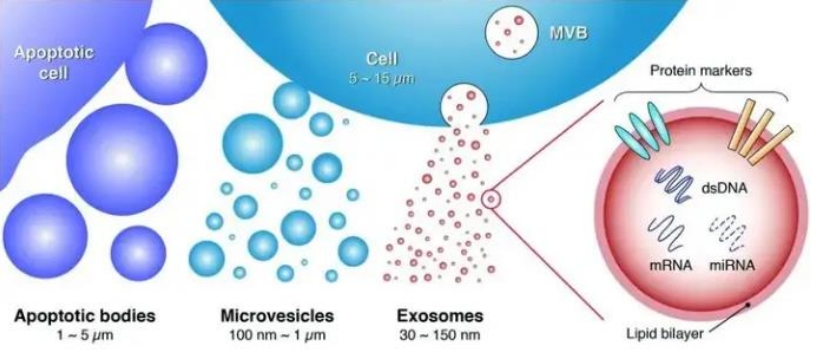Author: Site Editor Publish Time: 12-18-2024 Origin: Site








You've probably heard a lot about exosomes recently, especially in the world of skincare and health. But what exactly are they? Are they something we need to worry about, or can they actually be beneficial for our health and beauty? Let's break it down in simple terms.
Exosomes are tiny particles, so small that they're only visible under a microscope. Exosomes are extracellular vesicles released by cells, with a 30-150 nanometers diameter.
Almost all types of cells in the human body can produce exosomes. Think of exosomes as little "messenger" packages. These packages are released by cells and float around in our body, carrying important information.
What's in these packages? Inside, exosomes carry bits of genetic material, proteins, and lipids (fats), which can influence other cells around them. In short, exosomes are like little delivery trucks, transporting messages from one cell to another.

Imagine you have a group of cells in your body, all working together to keep things running smoothly. Sometimes, these cells need to communicate with each other to coordinate their activities. That's where exosomes come in. When one cell wants to send a message to another, it packs the message into an exosome and sends it out. These exosomes then travel through the bloodstream or other body fluids until they reach their destination.
Once the exosome reaches another cell, it unloads its "cargo," which can help that cell perform specific tasks, like repairing tissue, responding to infections, or even rejuvenating skin. Because exosomes carry so many types of useful information, they have many potential roles in medicine and beauty.
Exosomes have a lot of potential when it comes to medical treatments. Researchers have been exploring how they can be used to help treat everything from tissue damage to chronic diseases. Here's how:
Healing & Regeneration: Exosomes play a role in healing wounds and repairing damaged tissue. For example, if you have an injury, your body might send out exosomes from cells in the area to encourage other cells to repair the damage.
Immune System Boost: Exosomes also help regulate the immune system. They can carry signals that help control inflammation or help the body respond to infections.
Potential in Cancer Treatment: Some studies suggest that exosomes can be used to deliver drugs directly to cancer cells, helping to target tumors more precisely with fewer side effects.
In the world of beauty and skincare, exosomes have gained a lot of attention for their potential to rejuvenate the skin. You might have heard about exosome-based treatments that promise to improve skin texture, reduce fine lines, and promote skin regeneration. Here's why they might work:
Cell Regeneration: Exosomes can carry signals that encourage the growth of new skin cells, helping to improve skin texture and reduce signs of aging.
Boosting Collagen Production: Collagen is a protein that helps keep skin firm and elastic. Some studies suggest that exosomes may help stimulate collagen production, making your skin look younger and healthier.
Reducing Inflammation: Exosomes can help reduce inflammation in the skin, which is important for treating conditions like acne, rosacea, or general skin irritation.
Click here to learn more about our exosome products and purchase them.
Exosome treatments are relatively new, so while research is promising, it's important to be cautious. Most exosome-based therapies are still being studied in clinical trials. It's always a good idea to consult with a healthcare professional before trying any new treatments, especially for things like skincare or medical therapies.
However, because exosomes come from the body's own cells, they're considered relatively safe compared to synthetic treatments. They don't carry the risk of allergic reactions or rejection that some foreign substances might. That being said, the quality and source of the exosomes matter—treatments should always be done in a professional, reputable setting.
Exosomes may be small, but their impact could be huge. From improving wound healing and boosting the immune system to revolutionizing skincare, these tiny particles have a lot of potential. As research continues, we may find even more uses for exosomes, making them an exciting area of medicine and beauty.
So, next time you hear about exosomes, you'll know that these tiny messengers are doing some big things inside your body—helping you heal, stay healthy, and even look your best!
content is empty!
